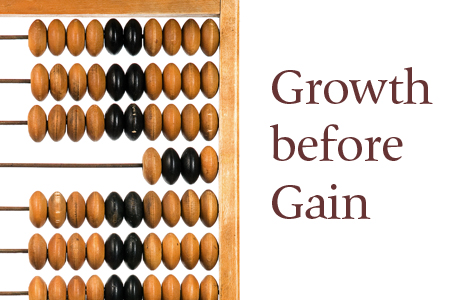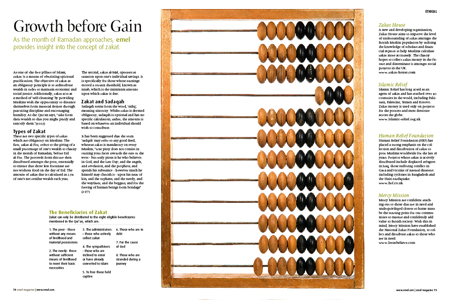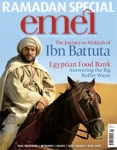
An insight into Zakat
Issue 71 August 2010
As the month of Ramadan approaches, emel provides insight into the concept of zakat.
As one of the five pillars of Islam, zakat is a means of obtaining spiritual purification. The objective of zakat as an obligatory principle is to redistribute wealth in order to maintain economic and social justice. Additionally, zakat acts as a method of ‘self-cleansing’ by providing Muslims with the opportunity to distance themselves from material desires through practicing discipline and encouraging humility. As the Qur’an says, “take from their wealth so that you might purify and sanctify them.”(9:103)
Types of Zakat
There are two specific types of zakat which are obligatory on Muslims. The first, zakat al-Fitr, refers to the giving of a small percentage of one’s wealth to charity in the month of Ramadan, before Eid al-Fitr. The proceeds from this are then distributed amongst the poor, essentially to ensure that those less fortunate are not without food on the day of Eid. The amount of zakat due is calculated as 2.5% of one’s net residue wealth each year.
The second, zakat al-Mal, operates as taxation upon one’s individual savings. It is specifically for those whose earnings exceed a certain threshold, known as nisab, which is the minimum amount upon which zakat is due.
Zakat and Sadaqah
Sadaqah stems from the word, ‘sidiq’, meaning sincerity. Whilst zakat is deemed obligatory, sadaqah is optional and has no specific calculation; rather, the amount is based on whatever an individual should wish to contribute.
It has been suggested that the term ‘sadqah’ may refer to any good deed, whereas zakat is mandatory on every Muslim; “true piety does not consist in turning your faces towards the east or the west - but truly pious is he who believes in God, and the Last Day; and the angels, and revelation, and the prophets; and spends his substance - however much he himself may cherish it - upon his near of kin, and the orphans, and the needy, and the wayfarer, and the beggars, and for the freeing of human beings from bondage” (2:177)
The Beneficiaries of Zakat
Zakat can only be distributed to the eight eligible beneficiaries mentioned in the Qur’an, which are:
1. The poor - those without any means of livelihood and material possessions
2. The needy- those without sufficient means of livelihood to meet their basic necessities
3. The administrators – those who actively collect zakat
4. The sympathisers - those who are inclined to enter or have already converted to Islam
5. To free those held captive
6. Those who are in debt
7. For the cause of God
8. Those who are stranded during a journey
(We did an extended feature on the recipients of zakat last year. You can check it out here)
Zakat House
A new and developing organisation, Zakat House aims to improve the level of understanding of zakat amongst the British Muslim population by utilising the knowledge of scholars and financial experts to help Muslims calculate zakat more accurately. The charity hopes to collect zakat money in the future and disseminate it amongst social projects in the UK.
www.zakat-house.com
Islamic Relief
Islamic Relief has long acted as an agent of zakat and has reached over 40 countries in the world, including Pakistan, Palestine, Yemen and Kosovo. Zakat money is used only on projects for the poorest and most destitute across the globe.
www.islamic-relief.org.uk
Human Relief Foundation
Human Relief Foundation (HRF) has placed a strong emphasis on the collection and distribution of zakat to poor Muslims worldwide for the last 18 years. Projects where zakat is actively distributed include displaced refugees in Iraq, those suffering conflict in Gaza and victims of natural disasters including cyclones in Bangladesh and the Haiti earthquake.
www.hrf.co.uk
Mercy Mission
Mercy Mission are confident reaching out to those that are in need and underprivileged closest to home must be the starting point for our communities to mature and confidently add value to British society. With this in mind, Mercy Mission have established the National Zakat Foundation, to collect and distribute zakat to those who are in need.
www.letusbelieve.com
If you want to read the feature in its entirety,
pick up a copy of the latest issue

1) Delivered to your door for only £3.50 with FREE Postage and Packaging
You can get your latest issue of emel with FREE Postage & Packaging.
Click here for terms and conditions
Call us on 020 7328 7300 or email info@emel.com.
2) Subscribe for one year - now only £29.95
You can subscribe for only £29.95 (that's 50% off the standard UK subscription price) and get 12 issues delivered straight to your door, every month..
Call us on 020 7328 7300 or email info@emel.com
Bookmark this |
|
Add to DIGG |
|
Add to del.icio.us |
|
Stumble this |
|
Share on Facebook |
|
Share this |
|
Send to a Friend |
|
Link to this |
|
Printer Friendly |
|
Print in plain text |
|


Comments
0 Comments